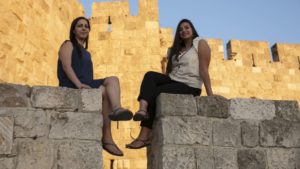Jewish Settlers & West Bank Palestinians: Young Women Sharing Language in Jerusalem

Manar Bader, a 26-year-old Palestinian from East Jerusalem, and Lior Urian, a 32-year-old Jewish Israeli from Tel Aviv, in Jerusalem, September 2019
Nir Hasson reports in Haaretz:
Manar Bader, a 26-year-old Palestinian woman from East Jerusalem, and Lior Urian, 32, a Jewish Israeli from Tel Aviv, met in the hall at Hebrew University of Jerusalem nine years ago and became friends. “We lived in two separate spheres with deep ignorance and gaps in language, but we became friends quite quickly,” says Urian.
“I was an out-of-touch resident of Tel Aviv, and via Manar’s story, I understood the reality of the eastern part of the city,” she said, referring to East Jerusalem, “the people behind the facts. Years later we thought that our story was the story of the city, and we wanted to build a platform that would make it possible for other women to better understand the other side.”
Two years ago the pair decided to try to expand their mutual circle of friends in Jewish and Arab neighborhoods of Jerusalem. They started a Facebook page where they proposed creating a women’s group in which Arab women would teach their Jewish counterparts Arabic and the Jewish women would teach the Arab women Hebrew.
Within two days, 250 women from all over Jerusalem had signed up. Now, two years later, their numbers have swelled to about 700 registered participants. The first meeting was held on the roof of the Panoramic Golden City Café in Jerusalem’s Old City, which hosted the group without charge. Since then the group has become the largest independent Hebrew-Arabic language group in the city, but it has also become much more than that. The members speak about empowerment, breaking down barriers, getting to know the other side and mutual assistance.
For most of the period since Jerusalem was reunited in the 1967 Six-Day War, Jews and Arabs living in the city did not made great efforts to learn each other’s language. The exceptions were generally Arab men, who learned Hebrew if they worked with Jews, and many older Jews, who knew Arabic from home.
